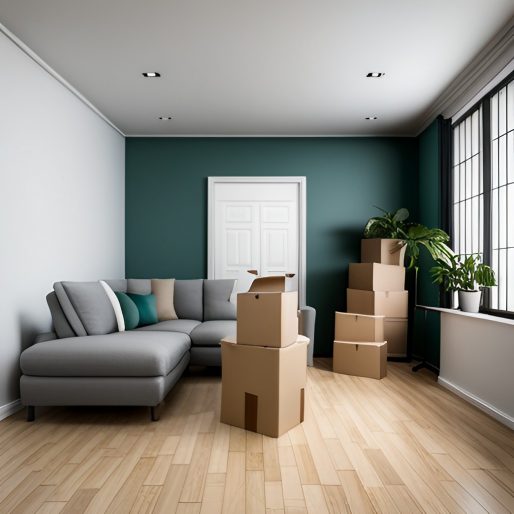Imagine you’ve just moved into a new two-bedroom apartment, surrounded by a sea of boxes. It’s a daunting task, isn’t it?
You’re probably wondering, ‘how long is this going to take to unpack my apartment?‘ The time it takes to unpack an apartment can vary greatly depending on several factors, such as the number of belongings, your organization skills, and even your motivation level.
While some folks can get settled in a week, others might take a month or more. So, what’s your plan? Let’s explore strategies to streamline this process and make your new apartment feel like home sooner.

Assessing Your Belongings
Before you dive into unpacking, it’s essential to take a good look at all your belongings and start formulating a systematic plan based on what you have. Let’s delve into a process called belongings categorization.
This step involves sorting through your items, grouping similar items together. It’s not just about making piles of kitchenware, books, and clothes. You’ll also need to identify valuable items for careful unpacking later, as well as sentimental belongings that require special handling.
Now, let’s consider downsizing strategies. If you’ve moved into a smaller space, or if you’re just looking to eliminate clutter, this is a crucial step.
Ask yourself: Do you really need three sets of dishes or that old treadmill collecting dust? Be ruthless in your decision-making. Reducing your belongings not only saves space but also cuts down on the time and effort needed for unpacking.
Setting a Realistic Timeline
Once you’ve sorted and downsized your belongings, it’s time to set a realistic timeline for your unpacking process. This step is crucial for effective time management, stress management, and ensuring you’re not overwhelming yourself.
Being systematic and efficient, start by:
* Setting deadlines for each room or category of items.
* Scheduling breaks to prevent fatigue and maintain motivation.
* Allowing for timeline flexibility to accommodate unexpected delays.
* Incorporating buffer days for rest and other activities.
Remember, setting unrealistic deadlines can lead to frustration and stress, making the process more challenging than necessary. Instead, aim for achievable goals that take into consideration your pace and other commitments.
Incorporate break scheduling into your timeline to maintain your productivity and prevent burnout. By doing so, you’re not only managing your time effectively but also your energy levels.
Timeline flexibility is also essential. Unforeseen circumstances may arise, pushing your schedule off track. By building in buffer days, you can accommodate these without disrupting your overall plan.
Unpacking Priority Rooms First
Always start with unpacking your priority rooms, as these spaces frequently used will quickly make your apartment feel like home. Room prioritization is key for efficient unpacking. This typically includes the kitchen, bedroom, and bathroom – the rooms you’ll need functional as soon as possible.
You’re likely eager to perform your essentials unpacking. Start with your kitchen setup. Having a functional kitchen allows you to cook meals, saving you from costly takeouts.
Next, focus on your bedroom arrangement. A well-set bedroom provides a comfortable space for rest after a long day’s work. Lastly, don’t forget your bathroom essentials. Organize your toiletries and necessary items in a way that’s efficient and accessible.
Organizational Tips for Efficiency
To boost your unpacking efficiency, it’s crucial to implement a few organizational strategies. Incorporating decluttering strategies and efficient packing of your apartment or house will save you a great deal of time and stress.
Let’s delve into some practical tips:
**Categorizing items**: This involves grouping similar items together. It’s easier to unpack and find a place for items when they’re sorted by category.
**Decluttering strategies**: Minimize your belongings beforehand. This will make packing and unpacking more manageable. Don’t hesitate to donate, sell, or discard items you no longer need.
**Space planning**: Before you start unpacking, have a plan for where you’ll place your items. This will keep you from having to rearrange things multiple times and save you a lot of effort.
**Time management**: Set a schedule for unpacking. This will keep you focused and prevent you from feeling overwhelmed.
Dealing With Large Furniture
While you’re employing these organization tips, it’s important not to overlook the challenge of large furniture pieces. They require strategic furniture placement strategies and sometimes, innovative furniture arrangement to maximize your space.
First things first, sketch out a furniture map. It’s an efficient way to visualize how your furniture will fit into the new space. Consider the flow of traffic, natural light, and the purpose of each room.
Disassembling furniture is often necessary, especially for larger pieces. Here are some disassembling furniture tips: Always use the correct tools for moving furniture. Screwdrivers, Allen wrenches, and a rubber mallet are usually sufficient. Remember to keep all screws, bolts, and small parts in a labeled bag so they’re easy to find when reassembling.
Lastly, protecting furniture during unpacking is vital. Avoid dragging pieces across the floor; use furniture sliders or ask for assistance to prevent potential damage. For fragile items or pieces with sentimental value, consider using padded moving blankets for added protection.
Dealing with large furniture can be a daunting task, but with a systematic approach and the right tools, you’ll have your apartment set up in no time.

Utilizing Storage Space Effectively
In the maze of unpacking, effective utilization of your apartment’s storage space can significantly streamline the process and maximize your living area. Here are some space-saving hacks that can turn chaos into order:
**Vertical Storage**: Don’t just think horizontally. Use wall shelves and tall racks to make use of vertical space, especially in small areas.
**Utilizing Unused Areas**: The area under the bed or over the kitchen cabinets often go unused. Invest in storage boxes or baskets to keep things tidy and out of sight.
**Multipurpose Furniture**: Opt for furniture that serves multiple functions. A bed with drawers underneath or a coffee table with storage can save a lot of space.
**Maximizing Closet Capacity**: Use closet organizers, hooks, and hangers to make the most of your closet.
Every nook and cranny in your apartment can be a potential storage space. It’s all about looking at your space creatively and efficiently.
Maintaining Momentum and Motivation
After you’ve maximized your storage spaces, maintaining your momentum and staying motivated can significantly speed up the unpacking process. A key strategy is setting goals.
Make them small and achievable – unpacking a box or two after work, or organizing a specific room each day. This approach makes the task less overwhelming and provides a clear path forward.
Embracing break times is essential to avoid burnout. Don’t hesitate to take short, regular breaks to recharge. During these periods, do something you enjoy – read a book, go for a walk, or have a cup of coffee. Implementing fun into the process also helps. Turn on your favorite music or podcast while sorting through boxes, making the task less monotonous and more enjoyable.
Rewarding progress is crucial. Celebrate your achievements, no matter how small. Each unpacked box is a step closer to making your apartment feel like home. Treat yourself to a favorite meal, a movie night, or a small gift.
However, be wary of procrastination. It’s easy to put off unpacking, but doing so only prolongs the process. Stay focused, keep up the pace, and you’ll find your apartment unpacked before you know it.
Average time to unpack 1 bed apartment
So, how long does it typically take to unpack a 1-bedroom apartment? The answer varies based on several factors, but on average, it can take anywhere from 3 to 5 days if you’re systematic and efficient.
In brief, here are some strategies you can use:
– **Box Labeling Strategies**: Proper labeling can dramatically speed up the process. Knowing what’s in each box allows for a quick decision about where it belongs.
– **Unpacking Essentials**: Start by unpacking essentials like toiletries, basic kitchen items, and a change of clothes. This lets you comfortably live in your space while you unpack the rest.
– **Managing Unwanted Items**: Deciding what to keep or toss before you move can save time. You won’t waste time unpacking items you don’t want.
– **Streamlining Kitchen Setup**: Organize your kitchen items by how often you use them. Items used daily should be easily accessible.
– **Unpacking Clothing Techniques**: Unpack clothing by season or occasion, whichever suits your lifestyle better.
Average time to unpack 2 bed apartment
Unpacking a 2-bedroom apartment takes a bit more time, typically falling between 5 to 7 days, even when being methodical and organized in your approach. Employing efficient unpacking strategies can help expedite the process. Start with packing essentials like toiletries, bed linens, and a few kitchen items, as you’ll need them upon arrival.
Next, adopt a room by room approach. This not only makes the unpacking manageable but also gives you a sense of accomplishment as each room comes together.
Start with high-traffic areas like the kitchen and living room. Then, move on to the bedrooms. Break down the tasks into manageable chunks and you’ll find it’s not as overwhelming as it seems.
Consider involving professional movers if you’re strapped for time. They’re seasoned pros when it comes to packing and unpacking, and they can take a chunk of the task off your hands. However, it’s crucial that you supervise the process to ensure everything goes where you want it.
Unpacking your Apartment
Wrapping up, unpacking an apartment can be a daunting task, but with organization and a realistic timeline, it becomes manageable.
Remember, priority rooms first and use your storage effectively.
Interestingly, a recent study found that on average, it takes about 2-3 days to unpack a 1-bedroom apartment and about 5-7 days for a 2-bedroom.
Stay motivated, maintain momentum, and soon, you’ll be settled in your new space.
